Promoting Supply Chain CSR
Determining Procurement from the Standpoint of Providing Equal Opportunity and Fair Evaluation
Sharp’s business philosophy states, “Our future prosperity is directly linked to the prosperity of our customers, dealers and shareholders.” In line with this, Sharp works with suppliers and all other stakeholders to provide solutions to social issues through business and to mitigate impacts on society and the environment as it pursues sustainable growth and mutual prosperity.
To these ends, Sharp emphasizes maintaining impartiality and fairness in all purchasing activities and chooses who it will procure parts, materials, and equipment from by providing Japanese and overseas suppliers with an equal opportunity to do business with Sharp. This opportunity includes a fair evaluation of whether a supplier meets Sharp’s requirements in such areas as quality, standards, and performance.
Close Communication and Mutual Understanding
To ensure sustainable growth and mutual prosperity with its suppliers, Sharp is going beyond initiatives related to the quality, price, and delivery of parts and materials. Sharp is also seeking to fulfill its social responsibilities over a wide range of areas across the entire supply chain. These areas include product safety, environmental protection, human rights and labor, and health and safety.
Sharp’s basic concept, concrete policies, and requests to suppliers pertaining to procurement activities are set out in the Basic Purchasing Principles. In its Basic Purchasing Principles Requests to Suppliers, Sharp makes clear that it expects suppliers to actively work to ensure that, in addition to complying with all relevant laws, they are also in compliance with social norms, such as those regarding the arrangement of a proper labor environment, the prohibition of child and forced labor, the prohibition of discrimination, and the prohibition of bribery and unfair acts.
To deepen the understanding between Sharp and its business partners about sustainable procurement, Sharp communicates actively with supplier sales representatives on a daily basis.
Basic Purchasing Principles
Basic Procurement Concept
- Sharp's procurement activities are conducted in an open and impartial manner, with a fair evaluation given to suppliers in and outside Japan.
- Sharp will comply with all laws and regulations, and achieve mutual prosperity with suppliers.
- Sharp will fulfill social responsibility such as the conservation of the environment through its procurement activities.
- Sharp pursues optimal quality and cost to the fullest.
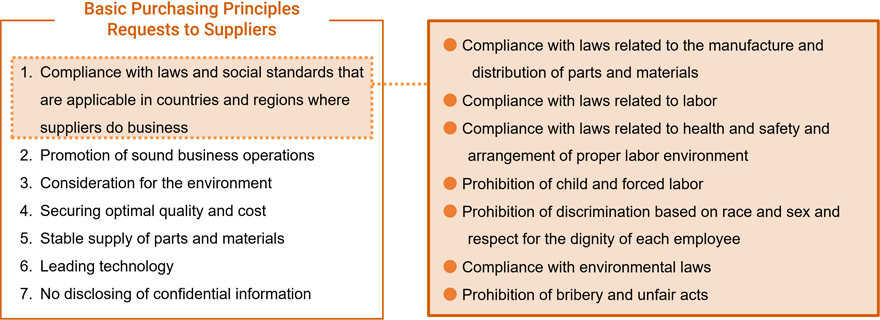
Overview of the Global Supply Chain
Sharp has 19 consolidated subsidiaries in Japan and 99 overseas (as of March 31, 2023). In line with the globalization of its business, 68.6% of sales are from overseas business; similarly, 73.0% of materials procurement, in terms of monetary amount, is by overseas production bases.
Sales by Region (Fiscal 2022)
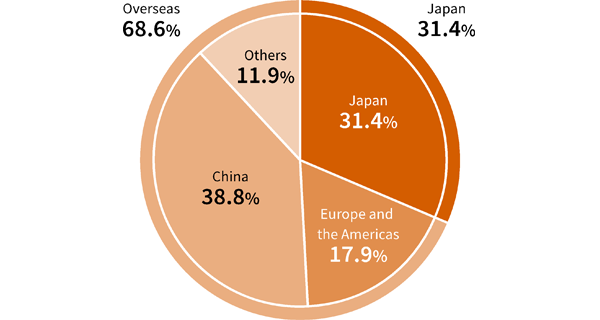
Procurement Amount Composition Ratio by Production Base (Fiscal 2022)
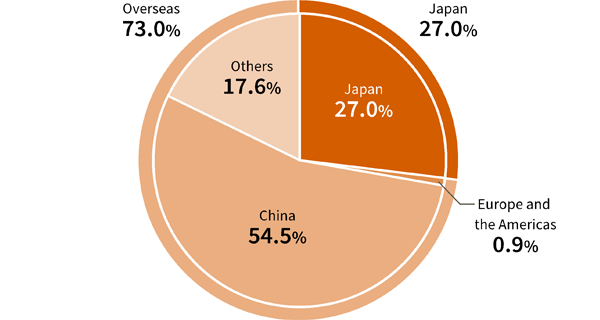
VE* Solutions Fair for Suppliers in Thailand
In August 2022, a VE solutions fair, the VE Exhibition, was held at SATL, Sharp’s production base in Thailand, with outstanding suppliers in Thailand being invited to attend.
At this event, products were broken down into their component parts and displayed. Local suppliers and SATL engineers and purchasing representatives engaged in lively discussions aimed at improving the value of these products.
By expanding local procurement of parts and materials, both Sharp and the suppliers benefit, thereby also contributing to the development of the local economy.
- * VE: Value engineering. VE efforts focus on the relationship between function and cost in order to better understand and improve the value of products and services.
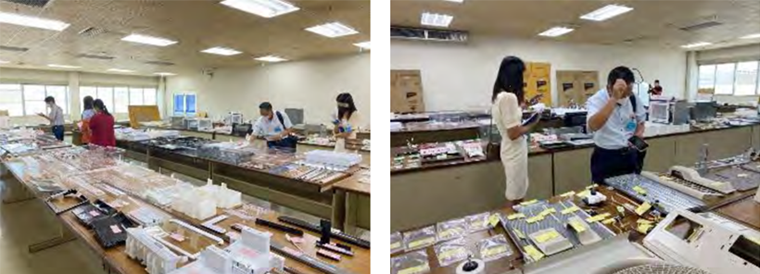
At the VE Solutions Fair
Promoting CSR across the Entire Supply Chain
| Fiscal 2022 Objectives | Fiscal 2022 Achievements | Self-Evaluation | Priority Objectives for Fiscal 2023 |
|---|---|---|---|
|
|
★★ |
|
- Self-evaluation: ★★★ Achieved more than targeted / ★★ Achieved as targeted / ★ Achieved to some extent
Participation in Industry Standard Initiatives
In December 2021, Sharp joined the RBA (Responsible Business Alliance), an alliance of companies that pursue social responsibility across the global supply chain. The RBA’s vision and mission are shared throughout the entire Sharp Group. Sharp also actively participates in the activities of groups such as the Japan Electronics and Information Technology Industries Association (JEITA), through which it contributes to the promotion of industry-wide CSR procurement.
Supply Chain CSR Policies and Systems
The Sharp Group’s fundamental policies with regard to CSR are established in the Sharp Group Charter of Corporate Behavior and the Sharp Code of Conduct. Every effort is made to ensure that all Sharp employees are aware of and adhere to these policies.
In order to strengthen the Group’s procurement system, an executive vice president was appointed to the position of chief procurement officer (Corporate Procurement Group general manager) in October 2022. The Corporate Procurement Group coordinates with each business unit and subsidiary’s procurement department to pursue Group-wide implementation of sustainable procurement activities conforming to the Sharp Code of Conduct.
In addition, the Sustainability Committee, which is chaired by the President & CEO, set supply chain ESG risk reduction as a key initiative. At committee meetings, members from relevant head office departments, along with business units and subsidiaries, share their policies and measures. The committee also monitors and manages progress on supply chain CSR-related measures.
Sharp Supply-Chain CSR Deployment Guidebook
To help suppliers understand and put into action CSR philosophy as stated in Sharp’s Basic Purchasing Principles, in fiscal 2007 the company formulated and distributed its own Sharp Supply-Chain CSR Deployment Guidebook. The Basic Products Purchase Agreement also includes articles on CSR initiatives, based on the guidebook, that suppliers are requested to follow.
In fiscal 2015, Sharp fully revised the content of its guidebook to conform to the RBA Code of Conduct. Since then, it has revised the guidebook as needed in line with revisions to the RBA Code of Conduct. In this way, Sharp strives to comply with the increasingly sophisticated international standards for CSR.
Content of Sharp Supply-Chain CSR Deployment Guidebook
A. Labor
- Freely Chosen Employment
- Young Workers
- Working Hours
- Wages and Benefits
- Humane Treatment
- Non-Discrimination
- Freedom of Association
B. Health and Safety
- Occupational Safety
- Emergency Preparedness
- Occupational Injury and Illness
- Industrial Hygiene
- Physically Demanding Work
- Machine Safeguarding
- Sanitation, Food, and Housing
- Health and Safety Communication
C. Environmental
- Environmental Permits and Reporting
- Pollution Prevention and Resource Reduction
- Hazardous Substances
- Solid Waste
- Air Emissions
- Materials Restrictions
- Water Management
- Energy Consumption and Greenhouse Gas Emissions
D. Ethics
- Business Integrity
- No Improper Advantage
- Disclosure of Information
- Intellectual Property
- Fair Business, Advertising, and Competition
- Protection of Identity and Non-Retaliation
- Responsible Sourcing of Minerals
- Privacy
E. Management System
- Company Commitment
- Management Accountability and Responsibility
- Legal and Customer Requirements
- Risk Assessment and Risk Management
- Improvement Objectives
- Training
- Communication
- Worker Feedback and Participation
- Audits and Assessments
- Corrective Action Process
- Documentation and Records
- Supplier Responsibility
Promoting CSR Awareness and Conducting Risk Assessment at Suppliers
Sharp periodically carries out CSR/Green procurement surveys to confirm how well suppliers are carrying out CSR based on the Sharp Supply-Chain CSR Deployment Guidebook and to identify, assess, and reduce CSR risk in the supply chain.
On the survey form, there are areas that conform to the RBA self-assessment questionnaire—labor, health and safety, environment, and ethics—as well as Sharp’s own areas, which are biodiversity/chemical substances management and business continuity planning (BCP). In fiscal 2020, Sharp added another area, information security, to deal with the rise in cyber security risks across the supply chain. Through such efforts, Sharp assesses risk in a wider range of areas in response to changing conditions inside and outside of the company.
To help suppliers understand things like the purpose and background of the survey, Sharp adds its own explanations to major questions. This helps make the survey a medium that prompts suppliers to further their understanding of international CSR standards.
The survey is carried out separately at each factory that makes products for Sharp. Survey scorecards are given to participating suppliers and those with low-scoring areas are asked to submit corrective action plans. Through such post-survey communication with suppliers, Sharp is continuously working to improve CSR across the supply chain.
In fiscal 2022, the survey was carried out at 409 bases of 93 companies in Japan. At production and procurement bases in China and ASEAN countries, since fiscal 2017 Sharp has been introducing two types of supplier management systems through which it has been carrying out ongoing risk management equivalent to that of Sharp in Japan.
There has been increasing concern around the world in recent years about issues such as slave labor and forced labor. Europe and North America have led the way in enacting, enforcing, or discussing laws promoting due diligence of human rights in the supply chain. One example is the Uyghur Forced Labor Prevention Act. With companies today expected to be stricter than ever in implementing CSR in the supply chain, Sharp makes human rights abidance in the supply chain key to the selection of suppliers.
Through such ongoing efforts, Sharp has found that across its supply chain there are no serious problems such as forced labor or child labor. If, through our continuing due diligence, it was determined that a human rights violation did occur, we would immediately enter into discussions with the supplier in question based on the supplier contract, and take the necessary corrective and relief measures. If no remediation is expected, we will take strict measures, such as suspending transactions.
Sharp will continue to step up its efforts in response to trends in international human rights due diligence as it fulfills its corporate social responsibility in every facet of the supply chain.
Assessment Distribution of CSR/Green Procurement Survey (Japan)
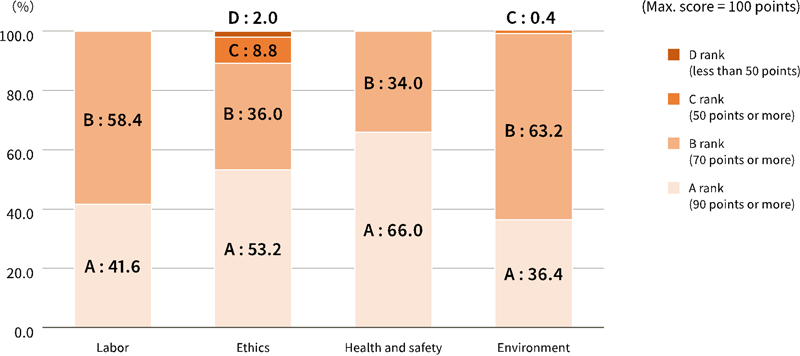
CSR/Green Procurement Survey: Examples of Ethics Issues and Solutions
| Issues | How to improve |
|---|---|
| Lack of a manual for properly managing ethical conduct | Formulate a corporate ethics policy |
| Employees are not sufficiently informed of permissible ethical conduct | Post information on bulletin boards in all departments |
| Provide e-learning to employees | |
| It cannot be confirmed whether suppliers are conducting themselves ethically | Conduct a questionnaire among suppliers |
Education for Procurement Personnel
To help all those in procurement positions company-wide improve their understanding and implementation of CSR, a thorough explanation of the Basic Purchasing Principles, along with a curriculum relating to supply chain CSR, is included in training materials for new employees, transferred employees, and management skills improvement. All Sharp Group employees also take compliance-related training based on the Sharp Code of Conduct, which covers topics such as respect for human rights.
Since February 2022, Sharp has been using the RBA e-Learning Academy to provide education on the RBA Code of Conduct to domestic and overseas staff, focusing primarily on those responsible for procurement. A total of 131 employees have completed 655 courses. In fiscal 2023, Sharp will expand the scope of employees receiving this training to promote greater understanding of international standards for CSR.
Procurement BCP
To ensure that corporate procurement departments secure a stable supply of parts and materials at fair prices, Sharp continuously strengthens partnerships with suppliers regarding long-term supply contracts and other matters, as well as purchases from multiple suppliers.
Sharp also uses the Rules of Business Risk Management to create and periodically revise business continuity plans (BCPs). As part of this, Sharp requires suppliers to periodically check and update the factories that produce items delivered to Sharp. It also carries out CSR/Green procurement surveys to confirm how well suppliers are making and maintaining BCPs.
Strengthening the Hotline and Consultation System for Suppliers
Sharp Corporation and its affiliated companies in Japan have set up the Crystal Hotline to handle organizational and individual legal and ethical violations. The hotline accepts reports and consultation requests from suppliers.
Additionally, in order to develop a grievance mechanism as required of companies by the United Nations Guiding Principles on Business and Human Rights (UNGP), Sharp is a regular member of the Japan Center for Engagement and Remedy on Business and Human Rights (JaCER). Since October 2022, a broad range of stakeholders, including global supply chain employees, have been able to make use of JaCER’s Engagement and Remedy Platform to submit reports in Japanese or English of human rights-related grievances.
Audits and Education to Ensure Full Compliance with the Subcontract Act
To comply with the Subcontract Act (Act Against Delay in Payment of Subcontract Proceeds, etc. to Subcontractors) in Japan, Sharp Corporation and its affiliated companies implement compliance checks and in-house education on an ongoing basis.
Sharp encourages internal voluntary reporting of compliance issues and further strengthened precautionary measures to prevent the recurrence of problems. Business units, procurement departments, Head Office departments, and domestic affiliated companies conduct self-audits in which they check how well they are complying with the Subcontract Act. Sharp also holds internal training sessions for domestic affiliated companies, has employees take part in outside seminars, and performs periodic internal audits to raise awareness among employees of the importance of complying with the Subcontract Act.
Responsible Minerals Procurement Initiatives
Policies and Systems for Responsible Minerals Procurement
In recent years, companies have had to expand the scope of their efforts regarding the minerals, regions, and risks involved in the responsible procurement of minerals. This means not only abiding by legal frameworks such as the Dodd-Frank Wall Street Reform and Consumer Protection Act of the United States and the EU’s Conflict Minerals Regulation, but also taking a firm CSR stand in light of issues such as child labor and environmental destruction at mining sites.
In the supply chain for procuring minerals from conflict-affected and high-risk areas, Sharp has a basic policy in place to ensure it is not complicit in human rights abuses and environmental destruction, and so that it does not inhibit sound, legitimate business activities.
Based on this basic policy and the Sustainability Committee, which is chaired by the president & CEO of Sharp, we have made responsible minerals procurement a key theme. A survey system has been created in major business units and production subsidiaries and we constantly check on the progress of relevant measures under this system.
Cooperation with Industry
To ensure that responsible minerals procurement is carried out effectively, Sharp believes in the importance of collaborating with industries in Japan and other countries and acting based on widespread consensus. Since fiscal 2012, Sharp has been a member of the Responsible Minerals Trade Working Group of the Japan Electronics and Information Technology Industries Association (JEITA).
We also actively take part in JEITA’s Responsible Minerals Sourcing Inquiry Briefings by helping in planning, creating documents, and joining the briefings as part of our efforts to spread understanding of responsible minerals procurement in the industry supply chain and boosting the capabilities of downstream companies. Together with JEITA, we periodically send outreach letters to smelters or refiners that are not yet participants of the RMAP*1 (created and operated by the RMI*2) urging them to undergo audits. These efforts are part of our contribution to effectively stamping out human rights abuses and other problems in the global procurement of minerals.
Furthermore, since December 2021, Sharp has been a member of the RMI, working to deepen our global collaboration and due diligence initiatives while ensuring we stay abreast of the latest international developments relating to responsible minerals procurement.
- *1 RMAP (Responsible Minerals Assurance Process) is an RMI program for validating conformance of RMI-listed smelters or refiners.
- *2 RMI: Responsible Minerals Initiative.
Survey Activities in Accordance with International Standards
Sharp uses the RMI’s international reporting templates (CMRT*3 and EMRT*4) to conduct surveys on 3TG (tantalum, tin, tungsten, and gold), as well as minerals such as cobalt and mica if requested by customers.
In the surveys, primary suppliers are urged to procure minerals from RMAP-conformant smelters or refiners. And based on the CMRT and EMRT returned by survey participants, we identify and evaluate risk based on the OECD*5 Due Diligence Guidance for Responsible Supply Chains of Minerals from Conflict-Affected and High-Risk Areas.
In fiscal 2022, as a result of about 400 surveys carried out at major business units and production subsidiaries, 300 smelters and refiners were identified and the RMAP conformance rate was about 73%*6.
For smelters and refiners that are not yet conformant with RMAP and those with high risk levels, we urge their participation in RMAP through the supply chain. If any smelters or refiners have been found to be dealing with militant forces or complicit in serious human rights abuses, this information is shared with suppliers, with whom we discuss measures such as switching to RMAP-conformant smelters or refiners.
- *3 CMRT (Conflict Minerals Reporting Template) is a free, standardized reporting template developed by the RMI.
- *4 EMRT (Extended Minerals Reporting Template) is a free, standardized reporting template developed by the RMI. It covers the cobalt and mica supply chains.
- *5 Organisation for Economic Co-operation and Development.
- *6 Conformance rate as of March 2023.
Education and Awareness Raising on Responsible Minerals Procurement
To deepen employees’ understanding of responsible minerals procurement, as a rule we hold monthly meetings with those in charge of surveys at major business units and production subsidiaries, where participants share information on the latest international developments and discuss practical survey issues and how to improve the survey system.
Procurement personnel and new employees take part in periodic supply chain CSR training, which covers responsible minerals procurement. Another way we further employees’ understanding on responsible minerals procurement is by uploading new and relevant material to the management skills improvement training page on the Sharp intranet.
Due Diligence Efforts in Line with OECD Guidance
To carry out responsible minerals procurement, Sharp integrates into its management a five-step framework for risk-based due diligence recommended in the OECD Due Diligence Guidance for Responsible Supply Chains of Minerals from Conflict-Affected and High-Risk Areas (OECD Guidance).
| OECD Five-Step Framework | What Sharp Is Doing |
|---|---|
| Step 1: Establish strong company management systems |
|
| Step 2: Identify and assess risk in the supply chain |
|
| Step 3: Design and implement a strategy to respond to identified risks |
|
| Step 4: Carry out independent third-party audit of supply chain due diligence at identified points in the supply chain |
|
| Step 5: Report on supply chain due diligence |
|